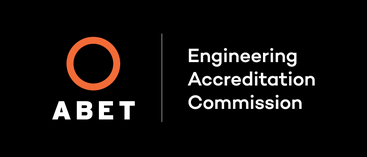
ABET Accreditation
The Bachelor of Science in Computer Engineering Program is accredited by the Engineering Accreditation Commission of ABET under the commission’s General Criteria and Program Criteria for Electrical, Computer, Communications, Telecommunication(s) and similarly named Engineering Programs.
Why does ABET accreditation matter?
Simply put, accreditation is value. Accreditation is proof that our Computer Engineering program has met certain standards necessary to produce graduates who are ready to enter their professions. Students who graduate from accredited programs have access to enhanced opportunities in employment; licensure, registration and certification; graduate education and global mobility. Visit the ABET website to see how ABET accreditation adds value to our students' experience.
How does ABET help us develop a strategic plan for students?
The ABET accreditation process gives us an opportunity to define Program Educational Objectives and Student Outcomes - what knowledge, skills and behaviors that students acquire by graduation. The current Student Outcomes were drafted in 2007 by our faculty, in consultation with students, employers, alumni and our advisory board. Because computer engineering is such a dynamic field, we revisit these Student Outcomes annually to ensure they are still relevant.
Program Educational Objectives
Graduates of UCR’s BS degree in this program will meet high professional, ethical, and societal goals as demonstrated by:
Success in post-graduation studies as evidenced by:
-
- satisfaction with the decision to further their education
- advanced degrees earned
- professional visibility (e.g., publications, presentations, patents, inventions, awards)
- Professional responsibilities (e.g. professional mentoring, professional society membership and offices, reviewing and editorial work for professional journals) success in a chosen profession or vocation as evidenced by:
- career satisfaction
- promotions/raises (e.g. Management leadership positions or distinguished technical positions)
- professional visibility (e.g., publications, presentations, patents, inventions, awards)
- professional responsibilities (e.g. professional registration, professional mentoring, professional society membership and offices)
- entrepreneurial activities
- consulting activities
- Contributions to society as evidenced by:
- leadership roles
- public service
- mentoring / outreach activities
- volunteer service
Student Outcomes
Our goal for our graduates
As a graduate of our program, you will be able to move onto the next chapter of your life with the following skills:
1) an ability to identify, formulate, and solve complex engineering problems by applying principles of engineering, science, and mathematics
2) an ability to apply engineering design to produce solutions that meet specified needs with consideration of public health, safety, and welfare, as well as global, cultural, social, environmental, and economic factors
3) an ability to communicate effectively with a range of audiences
4) an ability to recognize ethical and professional responsibilities in engineering situations and make informed judgments, which must consider the impact of engineering solutions in global, economic, environmental, and societal contexts
5) an ability to function effectively on a team whose members together provide leadership, create a collaborative and inclusive environment, establish goals, plan tasks, and meet objectives
6) an ability to develop and conduct appropriate experimentation, analyze and interpret data, and use engineering judgment to draw conclusions
7) an ability to acquire and apply new knowledge as needed, using appropriate learning strategies.
